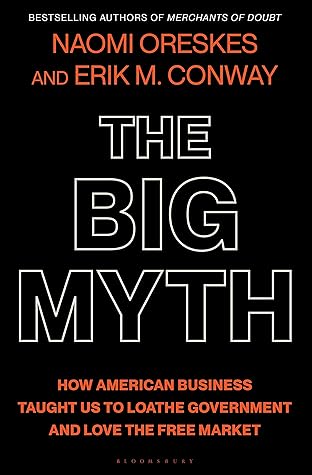More on this book
Kindle Notes & Highlights
Read between
September 28, 2023 - January 10, 2024
Business leaders were happy to be told they need worry about nothing other than making profits; white people to be told that discrimination was someone else’s problem; and industrialists that pollution was just a trifling “neighborhood” effect.
He asserted that lower tax rates would lead the wealthy to reinvest in their factories, without acknowledging the possibility that they might actually spend their added wealth on yachts, Fabergé eggs, or real estate in Pacific Palisades.
Reagan “took back about half the 1981 tax cut with subsequent tax increases.”
Within a few years, tax cuts to stimulate the economy had become Republican gospel.
The rich got richer, the poor got poorer, and the middle class treaded water.
Ronald Reagan cut taxes, George W. Bush cut taxes, Donald Trump cut taxes. And in every case tax revenue as a share of GDP fell and the federal budget deficits got bigger.
A 1999 study published in FDIC Banking Review estimated the direct cost to taxpayers of the savings and loan crisis at $124 billion.
Even economists agreed that telecom deregulation had not delivered on its promises.
In 2008, SEC chair Christopher Cox excoriated both the Gramm-Leach-Bliley Act and the voluntary regulatory framework, concluding that it was “abundantly clear that voluntary regulation does not work.
In 2018, the Federal Reserve Board of San Francisco concluded that, a decade on, the U.S. economy remained “significantly smaller than it should be based on its pre-crisis growth trend. One possible reason lies in the large losses in the economy’s productive capacity following the financial crisis. The size of those losses suggests that the level of output is unlikely to revert to its pre-crisis trend level. This represents a lifetime present-value income loss of about $70,000 for every American.”73 In total: about $23 trillion.
Clinton and his advisers seem to have fallen into the trap into which Williamson concedes he also fell: underappreciating that liberalization only works if coupled with effective governance.
To accept the enormity of what climate change portended for civilization was to accept that capitalism, as practiced, was undermining the very prosperity it was supposed to deliver.
In Europe, where these drugs are better regulated—and there is generally greater state support for injured or addicted individuals—there is no opioid crisis.
The American Dream becomes a receding horizon.32
The idea that we generate prosperity by cutting taxes on the rich is not just unethical, it’s untrue.
It wasn’t always illegal to dump toxic chemicals in lakes and rivers, but now it is. Once upon a time it was legal to buy and sell people.
It is not government’s job to make us happy, but it is government’s job to facilitate the conditions that help us to pursue happiness.
Rather, the Nordic countries are caught up in “a virtuous cycle, where well-functioning and democratic institutions provide citizens extensive benefits and security, so that citizens trust institutions and each other, which leads them to vote for parties that promise to preserve the welfare model.”


